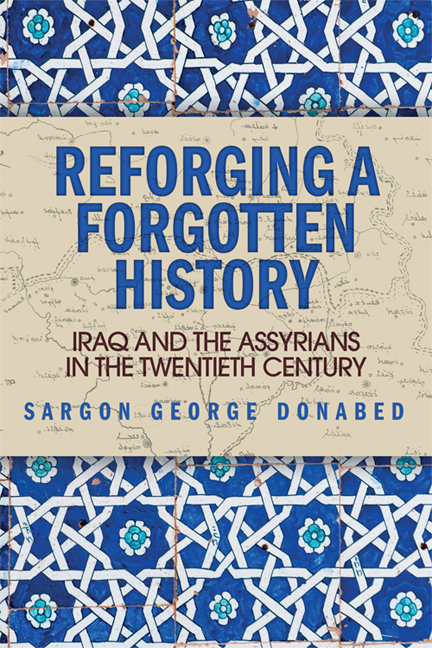Book contents
- Frontmatter
- Contents
- List of Figures
- List of Tables
- Abbreviations
- Acknowledgements
- Dedication
- Map
- Introduction
- 1 Integrating the Assyrian Question
- 2 Framing the Assyrian Narrative: Late Nineteenth and Early Twentieth Century
- 3 Iraq: Building a ‘Nation’-State
- 4 The Birth of the Republic and an Autonomist Struggle
- 5 Enduring Discord: Political Machinations and Border Clearings
- 6 New Movements and War on the Horizon
- 7 State Formation, State-building and Contentious Pluralism
- 8 Conclusion
- Glossary
- Appendix A Village Data
- Appendix B Documents Concerning Cultural and Political Organisations
- Bibliography
- Index
1 - Integrating the Assyrian Question
Published online by Cambridge University Press: 05 September 2016
- Frontmatter
- Contents
- List of Figures
- List of Tables
- Abbreviations
- Acknowledgements
- Dedication
- Map
- Introduction
- 1 Integrating the Assyrian Question
- 2 Framing the Assyrian Narrative: Late Nineteenth and Early Twentieth Century
- 3 Iraq: Building a ‘Nation’-State
- 4 The Birth of the Republic and an Autonomist Struggle
- 5 Enduring Discord: Political Machinations and Border Clearings
- 6 New Movements and War on the Horizon
- 7 State Formation, State-building and Contentious Pluralism
- 8 Conclusion
- Glossary
- Appendix A Village Data
- Appendix B Documents Concerning Cultural and Political Organisations
- Bibliography
- Index
Summary
Injustice anywhere is a threat to justice everywhere.
Martin Luther King JrTo return to the tripartite inquiries of the introduction in reverse, a solution to remedy the situation is now loosely established and will become more apparent in the succeeding chapters. The second major query mentioned comprises two parts: (a) What are the ways in which the Assyrians contribute to (in this geopolitical case) Iraqi history? (b) How and why is the Assyrian role in the (or a) narrative diminished or unnoticed both directly and indirectly and what purpose does it serve? As the major queries outlined, my own epistemology and methods are influenced by a panenhistorical approach to the past, meaning an inherent interconnectivity of all things which make up the experience of the past. Touching on this theme, it would do the reader well to recall the words of Martin Luther King Jr in his letter from a Birmingham jail: ‘Injustice anywhere is a threat to justice everywhere. We are caught in an inescapable network of mutuality, tied in a single garment of destiny. Whatever affects one directly, affects all indirectly.’ In a very real way, this testifies to the importance of the Assyrian case for Iraq and the Middle East, as a microcosm reflective of a macrocosm.
Returning yet again to the introduction, part of remedying the problem of unacknowledgement is tying their (the Assyrians’) past, present and future in with that of all of Iraq and its communities. The question becomes: on whom does the onus fall to create and sustain this effort? The Assyrians themselves are laden with the burden of responsibility for recounting their own history, otherwise they will continue to be omitted or relegated to a tertiary role of consequence in modern dialogues regarding Iraq. They have only recently become more involved in writing their own history, and that of their experience in Iraq, and offering it to a wider audience. There are numerous reasons for this, including the circumstance that academic pursuits are of minimal importance to peoples still living in a transient survival mode. It stands to reason that being a stateless, oppressed, underrepresented and sometimes unrecognised people can lead to further disassociation from such pursuits.
- Type
- Chapter
- Information
- Reforging a Forgotten HistoryIraq and the Assyrians in the Twentieth Century, pp. 27 - 53Publisher: Edinburgh University PressPrint publication year: 2015



